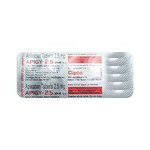cadiquis
Introduction to Cadiquis
Cadiquis is a medication primarily used to prevent blood clots in individuals with certain heart conditions. It is especially beneficial for those with atrial fibrillation, a condition that increases the risk of stroke. Additionally, Cadiquis is used after hip or knee replacement surgeries to reduce the risk of blood clots forming in the legs or lungs.
Composition of Cadiquis
The active ingredient in Cadiquis is Apixaban, which is a type of blood thinner. It works by inhibiting a specific clotting factor in your blood, known as Factor Xa. This action makes it harder for blood clots to form, thereby reducing the risk of strokes and other clot-related complications.
Uses of Cadiquis
- Prevention of blood clots in people with atrial fibrillation.
- Reduction of blood clot risk after hip replacement surgery.
- Reduction of blood clot risk after knee replacement surgery.
Side Effects of Cadiquis
Common Side Effects:
- Nausea
- Vomiting
- Diarrhea
- Abdominal pain
- Headaches
- Insomnia
- Unusual tiredness or weakness
Serious Side Effects:
- Severe bleeding, especially in the stomach and intestines
- Allergic reactions
- Confusion or decreased alertness
Precautions of Cadiquis
It is crucial not to stop taking Cadiquis suddenly, as this can increase the risk of blood clots. If you are allergic to Apixaban, have a history of severe bleeding, or are pregnant or breastfeeding, you should not take this medication. Always consult your healthcare provider before starting or stopping any medication.
How to Take Cadiquis
- Take Cadiquis orally, usually twice a day.
- The exact dosage and duration depend on the condition being treated.
- For hip replacement surgery, it is typically taken for about 35 days.
- For knee replacement surgery, it is typically taken for about 12 days.
Conclusion of Cadiquis
Cadiquis is an effective medication for preventing blood clots in individuals with certain heart conditions and those undergoing specific surgeries. While it offers significant benefits, it is essential to be aware of its side effects and take necessary precautions. Always follow your healthcare provider's instructions when using Cadiquis to ensure its safe and effective use.
Similar Medicines
Available in 2 variations

Cadiquis 5mg Tablet 10s
Cadiquis 5mg Tablet 10s
strip of 10 tablets

Cadiquis 2.5mg Tablet 10s
Cadiquis 2.5mg Tablet 10s
strip of 10 tablet
Related Faqs

How dangerous is Eliquis?
While using Eliquis you should be aware of the risks involved such as it can cause excessive bleeding being a blood thinner. Hence, do not stop taking the medication without speaking to your doctor. If you have epidural or spinal anesthesia or a spinal puncture while taking Eliquis then you may be at risk of developing a blood clot in or around your spine which can result in paralysis in some patients. Hence, inform the doctor beforehand if you have had any such procedure.

What is the safest blood thinner for AFib?
Non–vitamin K oral anticoagulants (NOACs) are now recommended as the preferred alternative to warfarin for reducing the risk of stroke associated with atrial fibrillation (AFib), according to a focused update to the 2014 American Heart Association/American College of Cardiology/Heart Rhythm Society Guideline for the ...

Can eliquis cause hair to fall out?
If you have any side effects while taking blood thinners, its important to have a conversation with your doctor about what you are experiencing. Although listed as a rare, or even nonexistent, side effect for most blood thinners, some people experience hair loss, or hair thinning, while taking them.

How dangerous is Apixabid 2.5 Tablet?
While using Apixabid 2.5 Tablet you should be aware of the risks involved such as it can cause excessive bleeding being a blood thinner. Hence, do not stop taking the medication without speaking to your doctor. If you have epidural or spinal anesthesia or a spinal puncture while taking Apixabid 2.5 Tablet then you may be at risk of developing a blood clot in or around your spine which can result in paralysis in some patients. Hence, inform the doctor beforehand if you have had any such procedure.
Related Posts

1:15
Why Is Calcium Important for Kids? Common Deficiency Symptoms You Shouldn’t Ignore!

1:15
How to Increase Your Child’s Weight Naturally? Healthy Diet Tips for Parents!

1:15
Are Your Hormones Out Of Balance? Signs & Symptoms!

1:15
Amazing Benefits of Flaxseeds | Best Way to Eat Flax Seeds Daily!

1:15
Why Is There Blood in Your Poop? Causes, Symptoms, and When to See a Doctor!
























.svg)
